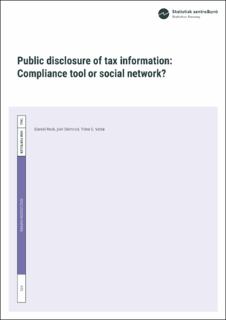Public disclosure of tax information: Compliance tool or social network?
Working paper
Permanent lenke
https://hdl.handle.net/11250/2985550Utgivelsesdato
2022-03Metadata
Vis full innførselSamlinger
- Discussion Papers [1002]
Sammendrag
We conduct the first-ever study of actual searches done in a public tax disclosure system, analyzing about one million searches done in 2014 and 2015 in Norway. We characterize the social network these searches comprise, including its degree of homophily and reciprocation, and the demographics of targets and searchers. About one-fourth of searches occur within identifiable household and employment networks. Most searchers target people similar to themselves—homophily in network parlance—but young, low-income searchers also target older, successful people and celebrities. A causal research design based on the timing of searches relative to tax filing uncovers no evidence that, upon discovering they were targeted, targets subsequently increase their reported income. The evidence suggests that social comparisons motivate the bulk of searches rather than tax compliance. However, public disclosure may deter evasion even when compliance-motivated searches are rare in equilibrium.

